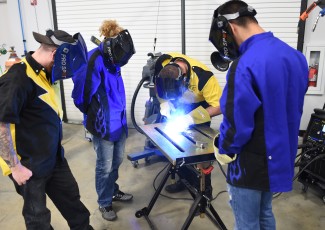Just in Time: A Training Model to Close the Skills Gap
By Federico Zaragoza
October 20, 2014
In automobile manufacturing, the Just in Time (JIT) training model refers to the production of presold automobiles. Essentially, manufacturers only build enough cars or trucks to meet existing demand.
In San Antonio, the Alamo Colleges take a similar approach to job training. Earlier this year, the district collaborated with the San Antonio Manufacturers Association (SAMA) and the local workforce board to launch a JIT job-training program that asks industry partners to commit to hiring graduates up front, promising guaranteed employment upon certification.
Since the program launched this spring, it has produced more than 250 certified machinists, CNC operators and production technicians to address the regional manufacturing skills gap.
Working with employers. SAMA was a champion for the program. The organization played a central role in recruiting employers willing to make up-front hiring commitments, assuming Alamo Colleges could guarantee that JIT graduates would meet specific industry skill standards. This discussion led to the infusion of a competency-based education (CBE) curriculum and alignment to the Manufacturing Skill Standards Council (MSSC) and National Incident Management System (NIMS) certifications.
Training based on competency. SAMA and the Alamo Colleges have a long history of collaboration. Together, the organizations have partnered on several efforts to address the manufacturing skills gap, including the creation of Dual Credit Manufacturing Academies and Associate Degree Pathway programs. On the industry side, SAMA employers participated in National Alliance of Manufacturing (NAM) competency mapping projects, including MSSC and NIMS benchmarking. SAMA was deliberate in its request that the Alamo JIT curriculum align to job readiness certification plus MSSC certification for production technicians and assemblers, and NIMS certification for machinists. This ensured that our students had the skills they needed, upon certificate completion, to fill the available jobs.
Faster to mastery. Alamo Colleges proposed a blended, self-paced CBE curriculum that allows students to progress through skills modules as they demonstrate mastery. The program allows students, particularly veterans, to complete multiple certifications and the required JIT competencies in a faster time frame (approximately 12 weeks).
A win-win-win. In just a few short months, the JIT program has demonstrated obvious benefits. For one, colleges work with industry partners to identify and meet regional economic needs. Second, the prospect of potential job opportunities has motivated students to succeed. Third, an emphasis on CBE encourages mastery by allowing participating students to move through job training programs at their own pace. The CBE model also allows the college to guarantee employers access to students with hirable skills.
It’s our experience through JIT that effective CBE training models provide an opportunity to address critical skills gaps. There is significant interest and investment in this type of JIT program. Alamo has been awarded approximately $1.5 million in state and local funding to enroll additional veteran cohorts in its JIT program. As part of that investment, the college recently launched an information technology and software development JIT program. The possibilities for growth in this arena are endless. The potential is clear: an accelerated path to certification and to a family-supporting job.
Did you enjoy this perspective? Want more? Don’t miss our upcoming series on competency-based education.

















